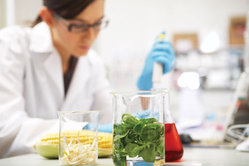If you’re interested in food security, the health and welfare of people who live in some of the poorest regions of the world and would like to go in that direction in your career, hats off to you! It’s challenging to live and work in a different country, where the culture and language may be unfamiliar to you. However, this is also some of the more fulfilling and worthwhile work anyone could want to do, and as the nonprofit section expands, there are more and more opportunities for people to enter this field, and get paid for it.
Let’s look at some examples of the sorts of posts available to food scientists like you.
Jobs
VSO is advertising their spot for a Food Technologist at the time of writing. This is a six-month position in Kenya, and you’ll need 3-5 years’ experience to be accepted. You’ll also need a degree in food science or food technology, and a post-graduate qualification in either is preferred. A background or interest in NGOs is required and branding experience would be advantageous. You’ll learn how to ride a motorbike before the placement begins. And you’ll be provided with a financial package which includes a local living allowance, return flights, accommodation and extensive training before you go.
You’ll be working will Help Self Help Centre’s Marketing and Value Chain Development Manager to build relationships with suppliers and customers, ensuring products are profitable, by: supporting safe and efficient development, modification and the manufacture of food products and processes using staff training and the implementation of a production line; scout for market to target; improve methods of quality control, source raw materials; plus other related tasks.
There are a wide range of organizations that work with food security exclusively. The Barilla Center for Food and Nutrition Foundation is a private non-profit and apolitical institution that produces valuable scientific content which can be used in inform and help people make conscious choices about food and nutrition and health and sustainability. Contact them at braillacfn.com to learn how you can get involved.
The Center for Food Safety is another powerful organization and nonprofit that works to protect human health and the environment by curbing the use of harmful food production technologies and promoting organic and other forms of sustainable agriculture. At the time of writing, they are seeking to find a Research & Administrative Intern based in Washington, D.C., to join the small but diverse team working on policy, litigation and advocacy campaigns. In this post, you would be supervised by the Operations Director and would work with the Executive Director, Policy Analysts, Program Directors and the Legal Team. You should be prepared to manage several tasks and responsibilities simultaneously as well as perform research, and write and edit CFS materials. You only need a Bachelor’s Degree, a strong interest in sustainable agriculture and food, organics and the negative aspects of the industrial food system. Check out centerforfoodsafety.org for more information on this or other posts.
Courses
If you’re going to work in a humanitarian job, you don’t have to study a straight Food Science or Technology master’s degree if you don’t want to. You could, and if that’s what you’d like to do, great. Go for it! However, there are a lot of fascinating programs out there that you could consider.
The M.Sc. in Food Security at the University of Warwick, UK, draws together critical components such as the contribution of climate change, biodiversity, water, soil, land use, labor, nutrition transition and urbanization with food security.
This two-year, full-time course includes modules on: Crop Physiology and Production; Advances in Crop Protection; Soil, Water and Mineral Nutrition; Environmental Accounting and Ecosystems Services; The Global Food System; Organic and Low Input Systems; Challenges of Global Food Security and a Project/Work Placement, among a number of other compulsory and optional modules. Tuition fees are just under 19,700 GBP.
If you’ve always wondered what living in the rolling hills of Wales is like, what about the M.Sc. in Food, Space and Society? This course is specifically aimed at students who wish to gain expertise in contemporary food geographies, and includes the study of the theoretical debates surrounding food at different spatial scales, as well as justice and sustainability and the scope for applying cutting-edge policy and practical solutions to the challenges that face the increasingly complex food system.
The M.Sc. in Sustainability in Agriculture, Food Production and Food Technology in the Danube Region (and the multicultural European region in general) is of interest to you, and you like to travel, the BOKU University of Natural Resources and Applied Life Sciences in Vienna, Austria is the host of this master’s program. You’ll actually have to travel and study at at least three different universities!
Once you’re done with this program, you’ll have a deep knowledge of agriculture and food production and the sustainability of the Danube Region, have the capability to select and apply adequate methods for sustainability in agriculture, food production and food technology. You’ll have studied Food Safety and Consumer Science; Biotechnology; Sustainable Energy Systems; plus many other modules. Get in touch with the institution for more information on the cost of this two-year course.
Ghent University in Belgium offers a M.Sc. in Nutrition and Rural Development: Human Nutrition. There are a range of different elective courses to choose from, but the common part of the program consists of the study of production, transformation, preservation, marketing and the consumption of food products. The practical component of the program involves identifying problems using quantitative and qualitative research methods and analytical techniques and how to plan, execute and evaluate the appropriate interventions.
Choosing a master’s program can be overwhelming. But we’re sure that there are a few you’ve been looking at that just seems to jump out at you. Every master’s course has something to offer, and you can often take your research in a unique direction that interests you personally. If you’ve nailed down a few courses and need help with the final push of writing your personal statement, shoot us an email! We’ll be happy to provide you with a statement that’s based on decades of academic experience.


 Nutrition and Food Safety as Key to Our Survival in the Developing World
Nutrition and Food Safety as Key to Our Survival in the Developing World
